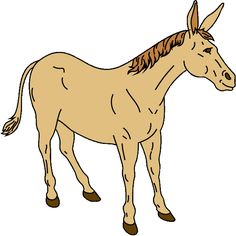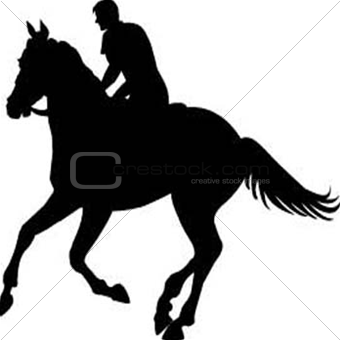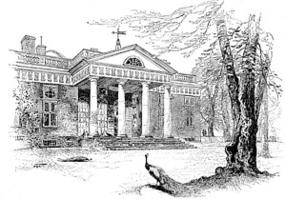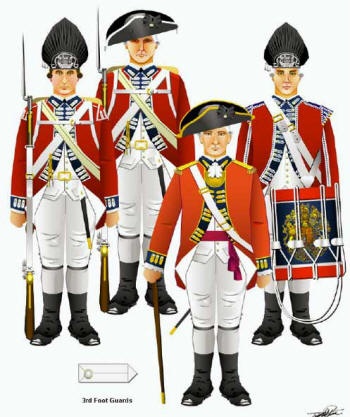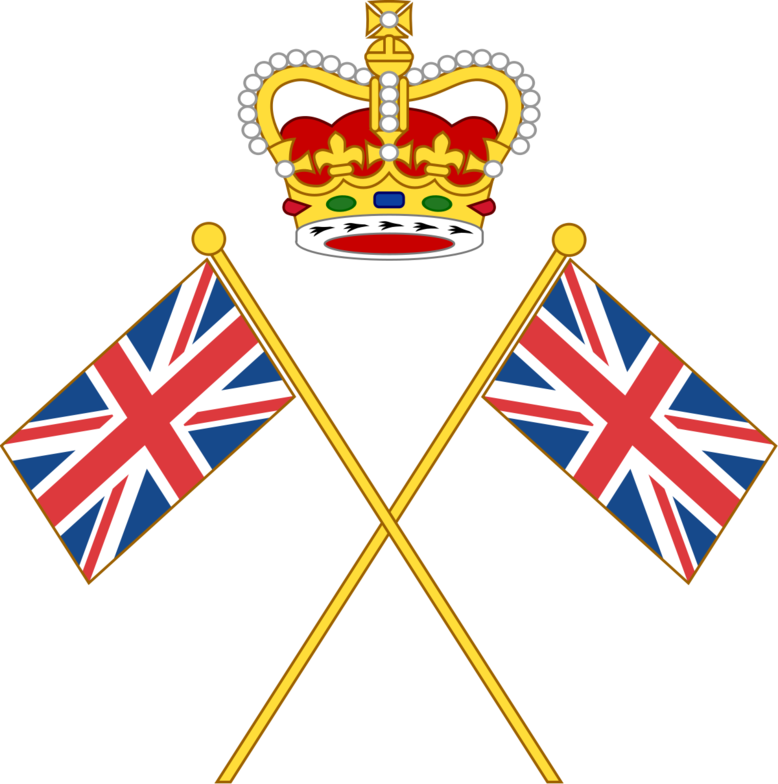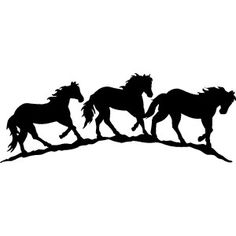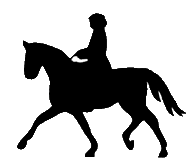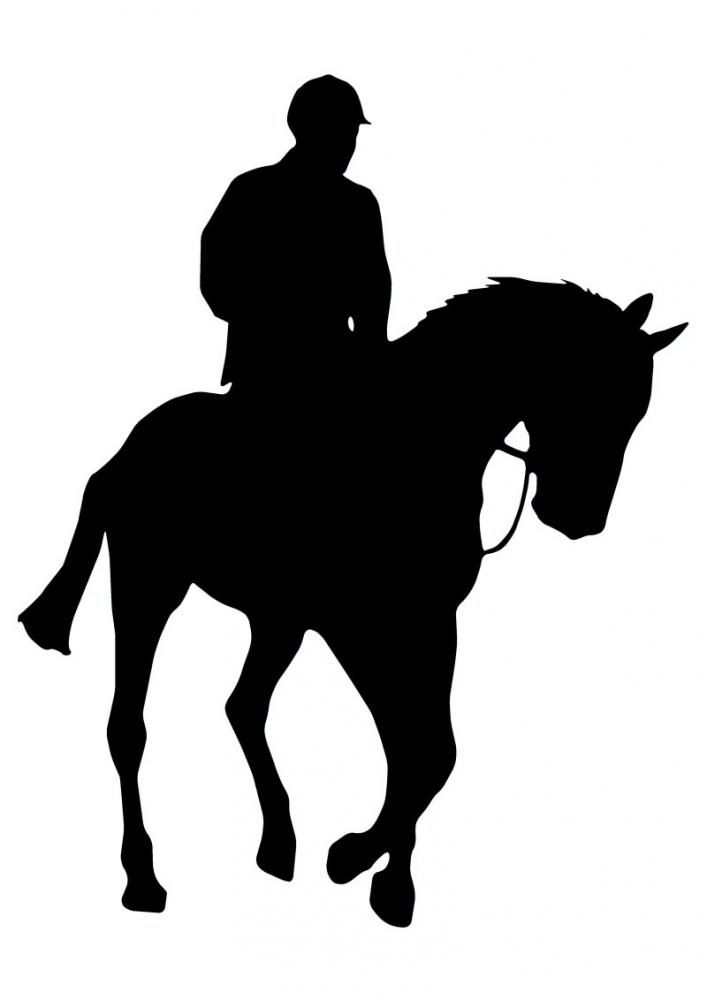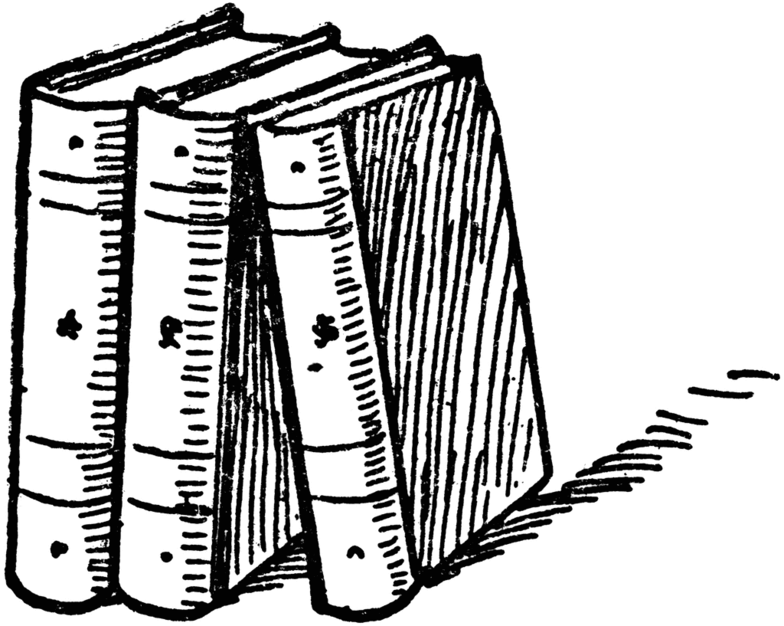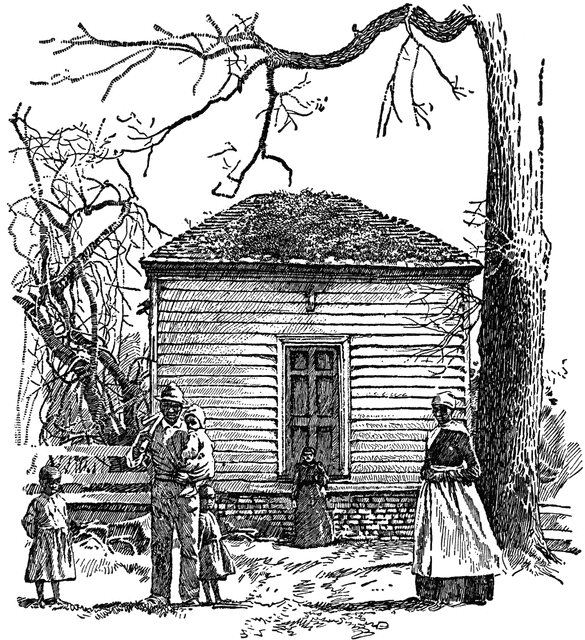SoulsinMyFamily.org
Jupiter was one of Mr. Jefferson's most well known slaves. Born in the same year, (1743) as the future President, the two boys grew up together at Shadwell, Peter Jefferson's farm on the edge of the Virginia frontier. Jupiter would grow up to be a prominent slave at Monticello.
Thomas Jefferson was two years old when his father moved the family from Shadwell to Tuckahoe, the plantation of his friend, William Randolph. Family tradition says that his earliest memory was being carried by a slave on that journey:
"Thomas Jefferson was two years old when the family exodus took place, and he used to mention as his first recollection, his being handed up and carried on a pillow by a mounted slave, as the train set off down the river toward Tuckahoe." (1)
From Shadwell to Tuckahoe
For the next several years the Jeffersons lived at Tuckahoe. Peter and Jane Jefferson managed the plantation and raised Mr. Randolph's orphaned children. Jupiter was with his parents, Goliah and Jupiter, but no existing record tells us where they were living. The date when Thomas and Jupiter began their relationship is therefore unknown.
As a young man, Jupiter served as a manservant to his master. He traveled with him to Williamsburg when a young Thomas Jefferson attended the College of William and Mary. Many young men of the gentry class were accompanied by a slave while they attended college. Jupiter's duties probably included running errands and caring for Mr. Jefferson's clothes and horse, the usual chores of a manservant.
Jupiter continued to accompany his master on his many travels to the colonial capitol. In June 1768, Jefferson made an entry in his Memorandum Book:
"June 4. Borrowed of Jupiter 3 3/4 d."(2)
On the 17th of June he wrote:
"June 17. Pd. Jupiter 3 3/4 d." (3)
Over the years there are similar entries. Mr. Jefferson was in need of a few coins and Jupiter had the money to lend him.
While in Williamsburg, Thomas Jefferson visited The Forest, the home of John Wayles, a local lawyer. As his manservant, Jupiter accompanied him. During one of these visits both of these young men met their future wives. Mr. Jefferson would marry Martha Wayles Skelton, a young widow. Jupiter met and later married Suck, a slave girl who worked as a cook on the Wayles farm. Suck was later inherited by the Jeffersons when Mr. Wayles died.
Farm Book (4)
To Find a Wife...
In July, 1774 Jupiter was assigned a very important duty. He was traveling with Mr. Jefferson to Williamsburg when his master became too sick to travel further. Jupiter was sent on by himself to deliver an important document to the Virginia Convention. The document came to be known as "A Summary View of the Rights of British America". It was published without Jefferson's permission and lacking his name as author. Written boldly and ahead of its time, the pamphlet denied that the British parliament had authority over the colonies. It was written in reaction to the closing of the port of Boston. If Jupiter had not been a trustworthy slave it might never have been read by the patriots and influenced the coming Revolution.
Witness to History
During the War Mr. Jefferson was serving as Governor of Virginia and the family was living in Richmond, the new state capitol. In early 1781 the British sailed up the James River and invaded the capitol city. Mrs. Jefferson and the children were evacuated to Fine Creek, one of their farms to the west.
In his memoir, Isaac Jefferson reported that Jupiter and Sukey (Jupiter's wife) were among the family servants at the Governors House. The British invaded a second time in April the same year. According to Isaac, Jupiter and Sukey were with the Jefferson slaves captured by the British and taken to Yorktown where they stayed until the British surrender in October, 1781. Isaac remembered the details because he was taken along as well. He was about five years old at the time. In his memoir he states:
"And so the British carred them down to Little York (Yorktown). They marched straight through town and camped jist below back of the battlefield. Mr. Jefferson's people there was Jupiter, Sukey the cook, Usley (Isaac's mother), George (Isaac's father), Mary the seamstress, and children Molly, Daniel, Joe , Wormley and Isaac."(5)
But Isaac was mistaken in saying that Jupiter was captured and sent to Yorktown. Jupiter was busy driving Mrs. Jefferson and the children to safety. What an enormous responsibility - to be entrusted with the safety of your masters family. Mr. Jefferson wrote in his Memorandum Book:
"Apr. 24. Gave Jupiter to bear expences to Elk-hill L45." (6)
The Jeffersons youngest daughter just five months old, had died just nine days earlier. The note in the Memorandum book reads:
"Apr. 15. Our daughter Lucy Elizabeth died about 10. o'clock A.M. this day." (7)
By November, 1781, a month after Cornwallis' surrender at Yorktown, Mr. Jefferson sent Will Beck to locate and bring home the slaves taken captive before the siege. He made this note in his Memorandum Book:
"Nov. 25. Furnished Will Beck going in quest of my negroes with 38/hard money and L360 paper."(8)
Mr. Beck successfully found and brought home these slaves, but the slaves taken from farms in Goochland and Cumberland Counties, at least thirty in number, were never returned. Most of these people died of camp fever or smallpox while being held by the British army, where disease was rampant.
Adventure in Yorktown
Queries
Could Isaac really remember such details at such a young age?
This would have been a major event - could he have heard details of the story from other people?
Do you think his story is otherwise accurate?
Why did Mr. Jefferson choose Jupiter to help his family escape the British?
After Jupiter had traveled with Mr. Jefferson for several years he was replaced by a younger slave. He then worked as a coachman where he was in charge of the stable and responsible for the care of Mr. Jefferson's most valuable horses. He must have taken the job very seriously.
One day Mr. Jefferson told another slave to use one of the carriage horses to ride to the post office at Milton. Jupiter refused to allow the boy use of the horse. Jupiter held his ground, according to this account of the incident:
"The pampered coachman soon arrived to meet a look and hear a tone never before or afterwards witnessed at Monticello...but he (Jupiter) firmly declared that he must not be expected to keep the carriage horses in the desired condition, if they were to be "ridden round by boys". Mr. Jefferson admitted [to]this, but he told his coachman that he had better never again take quite so blunt a method of "telling his mind". And here the matter ended."(9)
Jupiter and Mr. Jefferson had problems with another animal, a prize mule housed in the Monticello stable. Mr. Jefferson wrote of the mules escape and his plan to recapture the animal:
"...I received my mule on the 6th. and for safe custody put her into the stable, from whence Jupiter let her escape on the 9th. If she should go to Varina and any of your people should be coming up, be so good as to send her: if nobody should be coming, as soon as I know of her arrival there I will send Jupiter for her as a punishment for his carelessness." (10)
Jupiter was spared this chore as a neighbor returned the mule a few days later.
"Feb. 16. Pd. Wm. Reynolds for takg. up mule 1.D." (11)
Horse Troubles
More Queries...
Why do you think Jupiter no longer traveled with Mr. Jefferson?
Do you think it was his choice?
Why did Jupiter feel confident enough to voice his opinion about the care of the horses?
In addition to his skills as coachman, Jupiter was also trained as a stonecutter. He worked under the tradesman William Rice, who came to Monticello to do stonework on the house. This work included building the stone columns on the East Portico. Jupiter, among others, was assigned to bring up the stone.
"Jupiter, Abram. and Phill are to raise the stone...1000 bushels of limestone to be raised by Jupiter..."(12)
Jupiter was also entrusted with the risky job of using gunpowder to open a canal near the Rivanna River.
"I have set George and his company to work in the canal according to your desire: Jupiter is with them and is constantly employed in blowing the rock at the upper end..."(13)
Other trusted duties...
Jupiter and Suck had a son named John Jupiter Ammon Philip Evans. There is no record of Jupiter having the last name "Evans". Phil became the boyhood friend of Thomas Jefferson Randolph, Mr. Jefferson's oldest grandson, in much the same way that Jupiter and Mr. Jefferson were companions in their youth.
In later years, Thomas Jefferson Randolph (the family called him Jefferson or Jeff) mentioned Phil in his recollections of life at Monticello. Jeff described their relationship:
"...fourteen years older than my oldest brother, having no companion of my own age, I associated entirely with the slaves and formed for them early and strong attachments. Little Phil, a year or two older than myself, small, active, intelligent, much of a humorist - was my companion in childhood and friend through life."(15)
When Jeff was violently attacked by his brother in law, Charles Bankhead. Phil was there to help:
"When I was injured in Charlottesville, he came to me of his own accord as soon as he heard it, that night. The next night he was sent for a phisician whom he found...in an adjoining county fifteen miles off, staying all night with a patient. The patients brother, unwilling for the Doctor to leave him that night, told Phil to put his horse up he could see the Doctor in the morning. Phil urged his orders to see him that night...Phil attempted to go into the house; the gentlemen seized him; Phil shouted murder; the Doctor came out to see what was the matter. He (Phil) had him at my bedside that night. On the fever consequent on my wounds leaving me (he was weak because his fever broke) on being raised up, I fainted; when I revived, Phil was holding me in his arms with his eyes streaming with tears."(16)
Little Phil
A Trusty Servant Express
Mr. Jefferson often directed his most trusted slaves to carry money and other valuables between himself and his neighbors. This was a task he often assigned ot Jupiter, as in this note Jupiter carried to John McDowell in Staunton:
"...having now to make a paiment, I send the bearer, Jupiter, a trusty servant express, to recieve and bring any sum you may have in readiness for me." (18)
Their Final Journey
In late 1799, Jupiter was again serving Mr. Jefferson as a traveling companion. Although taken sick even before they left home, Jupiter refused to remain behind. By the time they reached Fredericksburg, where Mr. Jefferson was to take the stage to Philadelphia, Jupiter was so miserable Mr. Jefferson left him at a tavern for his recovery. The Memorandum Book reads:
"Dec. 24. Gave Jupiter to buy blanket & expences home 9.33." (19)
This would be the last journey this master and his slave made together. Jupiter returned home to Monticello but never regained his health. By the end of January Jupiter was dead. Martha wrote to her father:
"...to your enquiries relative to poor Jupiter he too has paid the debt to nature; finding himself no better at his return home, he unfortunately conceived him self poisoned & went to consult the negro doctor who attended the Georges...he took a dose from this black doctor who pronounced that it would 'kill or cure'. 2 1/2 hours after taking the medecine he fell down in a strong convulsion fit which lasted from ten to elevin hours, during which time it took 3 stout men to hold him, he languished nine days but was never heard to speak from the first of his being seized to the moment of his death...the doctor...upon Jupiter's death has absconded." (20)
Mr. Jefferson wrote of the details of Jupiter's illness:
"By a letter recieved to-day also from mr Richardson I learn the death of Jupiter. he has fallen a victim to an imprudent perseverance in journeying. I was extremely against his coming to Fredsbg with me & had engaged Davey Bowles, but Jupiter was so much disturbed at this that I yielded. at the end of the second day's journey I saw how much he was worsted, & pressed him to wait at Hyde's a very excellent house till the horses should return, & I got the promise of a servant from thence, but he would not hear of it. at Fredericksburg again I engaged the tavernkeeper to take care of him till he should be quite well enough to proceed. and it seems that immediately on his arrival at home, he took another journey to my brother's where he died. I am sorry for him as well as sensible he leaves a void in my [domestic] administration which I cannot fill up." (21)
Escape to Canada?
Traveling with the Young Master
Questions about Little Phil
Phil risked his own safety to get medical help for Jeff - why would he do that?
Why do you think Phil chose to return to Virginia?
Was his loyalty to his master, Mr. Randolph, or to his family?
Queries
What is a conjurer?
Why would a slave consult a conjurer, even when their master would have a doctor treat them?
Why would Jupiter insist on traveling even though he was very sick?
What does Mr. Jefferson mean by "leaves a void in my administration"?
What sort of relationship do you think Jupiter and Mr. Jefferson had?
Jupiter served his master his entire lifetime. Mr. Jefferson trusted him with his money, his horses, and most importantly, his wife and children, in a time of great danger. Jupiter truly fulfilled Mr. Jefferson's description of him as a "trusty servant express".
Sources
(1) Randall, Volume 1, page 11.
(2) Memorandum Book, June 4, 1768, Founders Online.
(3) Memorandum Book, June 17, 1768, Founders Online.
.
(4) Farm Book, page 13.
(5) Jefferson at Monticello: Memoirs of a Monticello Slave, Bear, as dictated to Charles Campbell by Isaac, page 10.
(6) Memorandum Book, April 24, 1781, Founders Online.
.
(7) Memorandum Book, April 15, 1781, Founders Online.
(8) Memorandum Book, November 25, 1781, Founders Online.
(9) Randall, Volume 3, page 510.
(10) Thomas Jefferson to Thomas Mann Randolph, February 12, 1795, Founders Online.
(11) Memorandum Book, February 16,1795,Founders Online.
(12) Thomas Jefferson to Mr. Clarkson, September 23, 1792, Founders Online.
(13)Thomas Mann Randolph to Thomas Jefferson, August 14, 1793, Founders Online.
.
(14) Thomas Jefferson Memorandum to Richard Richardson, December 21, 1799, Founders Online.
(15) Thomas Jefferson Randolph Recollections, after 1871, ViU.
(16) Thomas Jefferson Randolph Recollections, after 1871, ViU.
(17) Thomas Jefferson Randolph Recollections, after 1871, ViU.
(18) Thomas Jefferson to John McDowell, October 22, 1798, Founders Online.
(19) Memorandum Book, December 24, 1799,Founders Online.
(20) Martha Jefferson Randolph to Thomas Jefferson, January 30, 1800, Founders Online.
(21) Thomas Jefferson to Thomas Mann Randolph, February 4, 1800, Founders Online.
In late 1799, Mr. Jefferson directed that Jupiter be responsible for guarding the main house:
"Jupiter is to move into the North Square cellar room, as soon as it is ready, for the safeguard of the house. In the mean time he should sleep in the diningroom or the South Square cellar room, & have a dog. No other fire to be kindled in the house." (14)
Phil also showed his loyalty to the Randolph family during the War of 1812. Travelling north with Jeff's father, he could have crossed the border into Canada and escaped slavery - but instead he returned with the horses entrusted to his care. Jeff later wrote in his memoir:
" ...My father commanding the 20th Regiment US Infantry for a time during the War of 1812 - Phil accompanied him on the march...Phil was sent with the horses by land...Phil was thus left with three horses on his hands without orders or money. Advice...to sell the horses, take the money and his freedom were daily pressed upon [him]. He conducted the horses in good condition to his master at the winter quarters of the army..."(17)
Jupiter
"A Trusty Servant Express"
Schoolhouse at Tuckahoe
